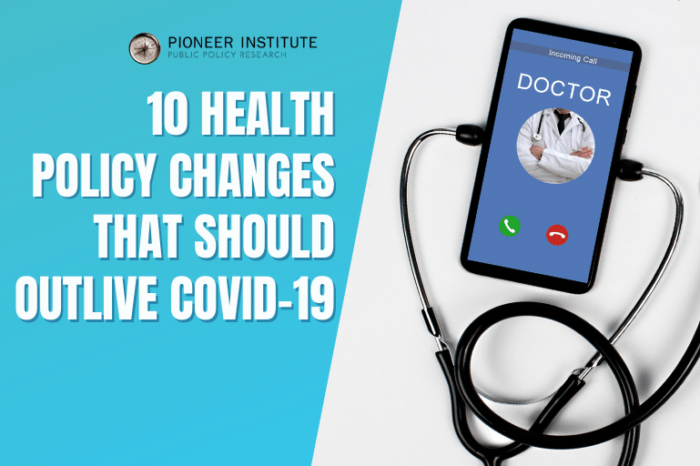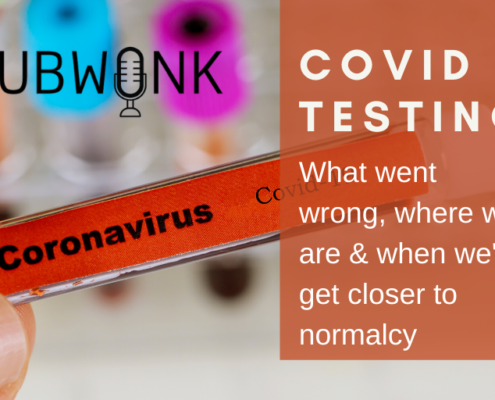Study: Massachusetts Should Retain Additional Healthcare System Flexibility Granted During Pandemic
Read coverage of this report in the Boston Herald and Associated Press.
Would improve readiness for next pandemic, make system more patient-centered and save money
BOSTON – Massachusetts’ emergency declaration for COVID-19 ends on June 15, and with it some enhanced flexibility that has been allowed in the healthcare system. Some of the added flexibility highlighted barriers that make the system more expensive, harder to access and less patient-centered, and the Commonwealth should consider permanently removing these barriers, according to a new study published by Pioneer Institute.
“Enhanced flexibility improves our readiness for the next pandemic, and saves money for patients, small businesses and taxpayers every other day of the year,” said Josh Archambault, author of “Ten Health Policy Changes That Should Outlive COVID-19.”
Ten Recommended Policy Actions:
Telehealth/Telemedicine
- Continue to ensure that any provider is permitted to utilize telehealth/telemedicine, including teledentistry and any emerging category of practitioners to allow for more team-based care.
- Avoid telehealth mandates that increase costs and may not result in better outcomes.
- Facilitate across-state-line telehealth.
- Allow patients to opt into the most accessible technology for telehealth to ensure lower-income and rural patients have access.
Provider Flexibility
- Flexibility on staffing ratios
- Allow any providers in good standing to register to practice and receive a full license.
- Allow more flexibility regarding where providers may practice.
- Allow more providers to practice at the top of their license (i.e., liberalize scope of practice).
- Make it easier for well-trained international medical graduates to come to Massachusetts.
Health System Flexibility
- Raise expenditure floors and suspend or repeal Determination of Need rules for a more flexible health infrastructure.
Intelligent Embrace of Telehealth
Archambault argues that state policy makers should permanently remove barriers to allowing all providers – including dentists, nurses, nurse practitioners and physician assistants – to use telehealth. Such a policy would free up doctors to concentrate on the most serious and complex cases.
Unfortunately, emergency orders that expanded the use of telehealth also included mandates that required most services to be covered and that the services be billed at the same rate as in-person visits. This is especially harmful to lower- and middle-income patients and those with disabilities and chronic conditions, because higher costs can cause them not to seek care, as many pay out of pocket until their insurance kicks in.
While the legislature and Governor did pass into law some new telehealth changes in early 2021, there is more work needed to realize the potential of innovative team-based care across state lines.
Since 2000, the amount employees pay toward their healthcare in Massachusetts has increased at about five-and-a-half times the rate of inflation, and telehealth is one of the few ways to reduce costs. Instead of mandates, insurers, employers, and publicly funded programs should be allowed to try innovative models to learn what works best.
During the pandemic, the Department of Public Health (DPH) allowed full across-state-line practice, meaning Massachusetts residents can access telehealth services from providers outside the Commonwealth. But that authority expires this summer.
Archambault suggests that the Commonwealth enact legislation similar to Minnesota’s. There, providers simply have to register with the appropriate board, provide basic information about their license, alert the board of any restrictions or negative licensing actions and pay a $75 fee to serve patients via telehealth.
Additional Provider Flexibility
A March 2020 order suspended mandates on nurse staffing ratios and generally gave hospitals more flexibility around staffing. Since research is inconclusive about whether staffing ratios improve care, the Commonwealth should make this flexibility permanent, which would enhance the ability to respond to the next pandemic.
Two more March 2020 orders allowed doctors and then other providers to practice in Massachusetts and across state lines under an emergency license. These should be extended to allow any providers in good standing in their primary state of practice to register, pay the appropriate fees and be granted a full license in Massachusetts. This could be codified through a slightly adapted version of the language in the current DPH guidance that allowed across-state-line care.
Enhanced flexibility and more independence in practice should also be codified for physician assistants, pharmacists, and pharmacy techs.
An April 2020 order provided expedited licensure for doctors who graduated from an international medical school and completed at least two years of postgraduate training. This increased the number of providers available to practice in Massachusetts by accessing the pool of those already practicing on a limited license.
However, for international medical graduates currently practicing abroad to come to Massachusetts, they have to repeat their residency when they come to the U.S. The Commonwealth should eliminate barriers for this much larger pool of physicians who are currently practicing abroad and want to practice here by creating a streamlined full licensing pathway that does not require them to repeat their residency.
Finally, Determination of Need (DON) laws and regulations artificially restrict the variety and number of care settings and equipment that can be utilized to treat patients. Massachusetts has 22 separate DON processes for things ranging from hospital beds to equipment to emergency medical transportation.
Massachusetts should either phase out DONs or raise the expenditure floor at which they kick in. The federal government repealed similar regulations in the 1970s. Joining the 12 states that have already done so would improve access to care, enhance competition, reduce prices, and improve quality.
About the Author
Josh Archambault is a Senior Fellow at Pioneer Institute. Prior to joining Pioneer, Josh was selected as a Health Policy Fellow at the Heritage Foundation in Washington, D.C. In the past, Josh served as a Legislative Director in the Massachusetts State Senate and as Senior Legislative Aide in the Governor’s Office of Legislative Affairs. His work has appeared or been cited in numerous news outlets. He is the editor and coauthor of The Great Experiment: The States, The Feds, and Your Healthcare. Josh holds a Master’s in Public Policy from Harvard University’s Kennedy School and a BA in Political Studies and Economics from Gordon College.
Pioneer’s mission is to develop and communicate dynamic ideas that advance prosperity and a vibrant civic life in Massachusetts and beyond. Pioneer’s vision of success is a state and nation where our people can prosper and our society thrive because we enjoy world-class options in education, healthcare, transportation and economic opportunity, and where our government is limited, accountable and transparent. Pioneer values an America where our citizenry is well-educated and willing to test our beliefs based on facts and the free exchange of ideas, and committed to liberty, personal responsibility, and free enterprise.
Get Our COVID-19 News, Tips & Resources!
Related Content:













